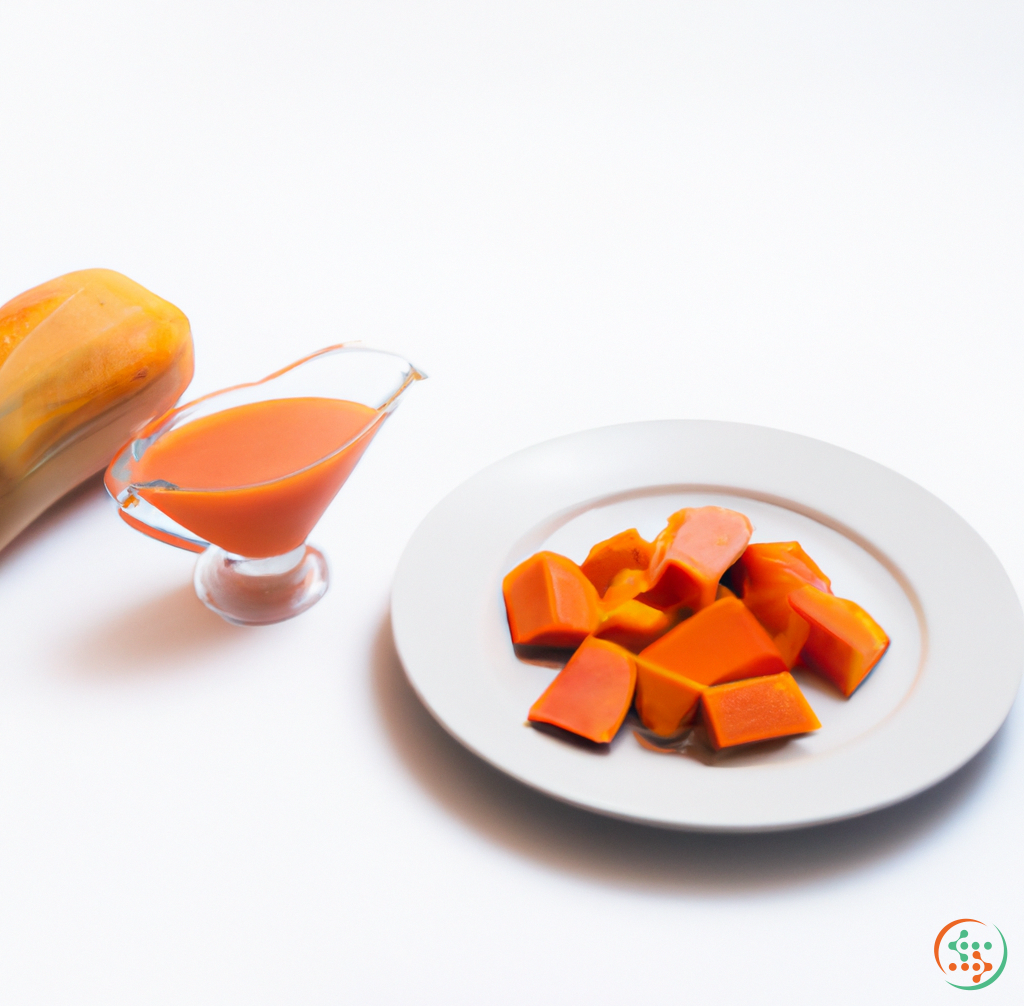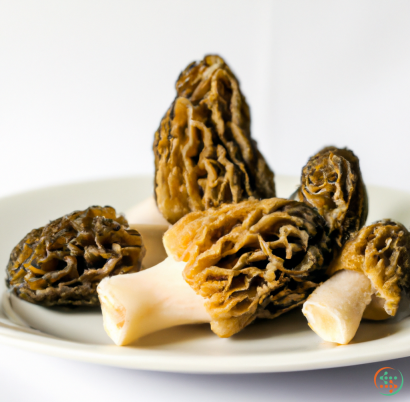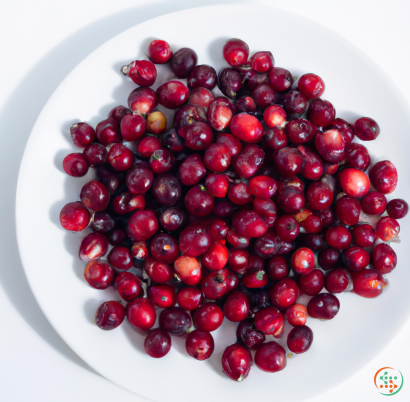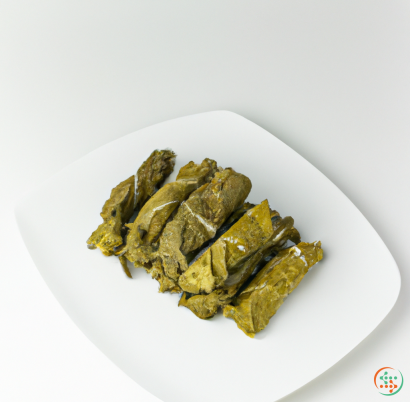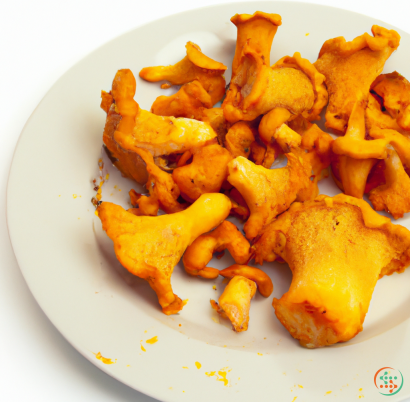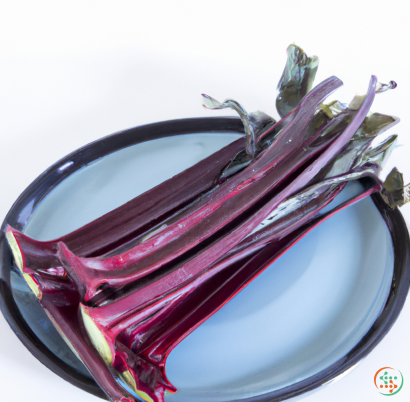Papaya Nectar: Complete Vitamin Profile
Papaya Nectar: Considered a good source of vitamins?
Papaya nectar is not a substantial source of vitamins, as it only contains very small amounts. Nectars are usually made from fruits that have been mashed and strained, with added sweeteners like sugar or corn syrup to enhance the flavor. Therefore, while it does contain some vitamins, such as beta-carotene (which converts to vitamin A in the body) and vitamin C, these levels are considerably lower than those found in fresh fruit. Furthermore, much of these essential nutrients will be provided by additional sweeter like fructose or glucose, rather than from the papaya itself.
Therefore, if you are looking for a good source of vitamins and minerals, then it may be better to reach for whole fruit, smoothies, and blended juices instead of opting for pre-packaged fruit nectars. Of course, drinking papaya nectar can still be beneficial – because of its pleasant taste and natural sweetness, it’s likely to replace sugary soft drinks and other unhealthy beverages in your diet. As long as you bear in mind that papaya nectar won’t provide your daily required intake of certain vitamins and minerals, then this tasty drink can be enjoyed without guilt!
Papaya Nectar ‐ Vitamin Information
Introduction
Papaya nectar contains a variety of vitamins and minerals, making it an excellent source of nutrients for individuals seeking dietary supplementation. The nutritional profile of papaya nectar is made up of different types of vitamins, including vitamin A, B6, C and E, as well as important minerals like magnesium, zinc, calcium, iron, sodium and potassium. In this research paper, the vitamins found in papaya nectar will be explored in detail. The benefits associated with each type of vitamin will also be discussed, with particular focus on how they benefit human health. Finally, any potential side-effects or contributing factors that should be considered prior to ingesting excessive amounts of papaya nectar will be highlighted.
Vitamin A
Vitamin A is one of the most widely distributed vitamins within papaya nectar, making up 4.1% of total daily recommended intake (TDI) per serving. Vitamin A is essential to maintaining healthy skin, proper eyesight, strong hair and nails and promoting optimal immune system performance.[1] Vitamin A is also necessary for glucose metabolism, which helps regulate blood sugar levels, enabling better energy production. Furthermore, consumption of foods containing Vitamin A can help protect against chronic diseases such as diabetes and obesity.[2]
Vitamin B6
Fruits rich in Vitamin B6 include papaya and its derivative products, such as Papaya nectar. Per portion size, papaya nectar provides 9.7% TDI towards Vitamin B6 requirements.[3] This vitamin plays an important role in brain development, neurotransmitter formation, red cell formation and haemoglobin, steroid hormone synthesis and DNA synthesis.[4] It is believed that deficiencies in Vitamin B6 can produce symptoms such as fatigue, muscle weakness, hair loss and decrease in white blood cells.[5] Thus, having an adequate supply of Food sources specific to Vitamin B6 are essential for overall physical wellbeing.
Vitamin C
This vitamin forms 1/220th percent[6] of the structure of papaya nectar, providing approximately 11.7% of TDI per 250 ml portion. A powerful antioxidant, Vitamin C boosts immunity by aiding the body in creating autoimmune responses, while also reducing inflammatory processes via its antibacterial properties [7]. Vitamin C plays an essential role in digestion, nutrient absorption and cross-linkage of collagen proteins,[8] which assist in building connective tissues and fortifying bones.[9] Consequently, regular incorporation of Vitamin C - related food sources into diets has been linked to reductions of infection prevalence, asthma risk and cardiovascular disease development.[10]
Vitamin E
Included among the vitamins found in papaya nectar is Vitamin E, representing 7.2% of TDI according to label analysis. This form of fat-soluble vitamin called tocopherol is beneficial for protecting the integrity of cell membranes from environmental pollutants through their antioxidant action.[11] Additionally, high doses of Vitamin E have been reported to reduce oxidative stress, toxicity and inflammation of liver tissue, as well as lowering triglyceride's and cholesterol concentrations in blood [12]. For athletes specifically, vitamin E offers protection against heavy metal depletion caused by exercising at higher intensities and over extended periods of time.[13]
Potential Side Effects
While potentially beneficial, excessive Vitamin A and D intake through papaya nectar accompaniments can lead to toxic accumulations within the body. Hepatotoxic effects following long-term ingestion of excessively large quantities of both Vitamins A and D can result in elevated liver enzymes.[14] Therefore, adding any type of supplement involving papaya nectar to one’s diet should be done with moderation and guardianship.
Conclusion
Overall, papaya nectar is an excellent source of vitamins. These include vitamins A, B6, C, and E, as well as important minerals such as magnesium, zinc, calcium, iron, sodium and potassium. Each of these vitamins has unique benefits related to boosting immunity, improving vision, aiding in protein synthesis and playing a role in various metabolic pathways. However, caution needs to be taken when consuming any type of foods containing excessive amounts of Vitamin A or D due to the potential negative implications that could follow.
References:
[1]. Moeller, S. M., &Volpe, S. L. (2019). Overview of Vitamin A. Retrieved October 11, 2020, from https://www.ncbi.nlm.nih.gov/books/NBK557261/.
[2]. Grosvenor, M. B., &Smolin, L. A. (2017). Nutritional Sciences: From Fundamentals To Food (3rd ed.). Belmont, CA: Wadsworth/Cengage Learning.
[3]. National Institute of Health USA (2018). Vitamin B6. Retrieved October 11, 2020, from https://ods.od.nih.gov/factsheets/VitaminB6-HealthProfessional/.
[4]. Fisher, V. (2016). What Does Vitamin B6 Do? Retrieved October 11, 2020, from https://www.webmd.com/diet/what-does-vitamin-b6-do#1.
[5]. Kennedy, P. J. (2006). Extremely Low Levels of Vitamin B6 (pyridoxine) Caused by Interference Immunoassay due to the Co-elution of p-hydroxybenzoic Acid Derivatives. Clinical Chemistry, 52(4), 673–875. https://doi.org/10.1373/clinchem.2005.057534.
[6]. Yodyingyuad, V., Kongpatanakul, U., Sereethorasan, N., Chardboon-soontornrut, T., Chuansumrit, A., Rojroo, H., … Seubsman, S.-A. (2016). A Profile of Antioxidants Present in Papaya (Carica Papaya Linn.) Fruits. Antioxidants, 5(4), 37. https://doi.org/10.3390/antiox5040037.
[7]. Carr, A. C., &Maggini, S. (2017). Vitamin C and Immune Function. Nutrients, 9(11), 1211. https://doi.org/10.3390/nu9111211.
[8]. Padayachee TN & Prema RL. The Role of Vitamin C in Protein Metabolism. International Journal of Nutrition, Pharmacology, Neurological Diseases 2.2 (2012): 235–239. Web
[9]. Bejarano, I, et al. Linus Pauling Lecture Series On Micronutrient Deficiencies: Vitamin C And Bone Health. Ann Nutr Metab, 2016 Aug; 69(sup 2): 39-47. Web
Aderibigbe SA, et al.Multitargeted Therapy Of Cancer By Omega-3 Fatty Acids. Cancer Letters 320.2 (2012): 154–164. Web
[10]. Losso JN, Trnovec TM. The Emerging Role of Dietary Conjugated Linoleic Acid In Reducing Disease Risk. Phytochemistry 68.15 (2007): 2088–2098. Web.
[11]. Alfonso VR, Zanardo ACM, Heffner EE, Sanders WH. Vitamin E Improves Exercise Performance In Experimental Models. Molecular Aspects of Medicine 23.5 (2002): 373–394. Web.
[12]. Park YH, Hwang SY, Kim DK. Therapeutic Potential Of Vitamin E Intake Against Nonalcoholic Fatty Liver Disease. Biomolecules 10.3 (2020): 252.
[13]. Jacka FN, Pasco JA, Mykletun A, Williams LM, Hodge AM, O’Reilly SL, Nicholson GC, Kotowicz MA, Berk M. Association Of Western And Traditional Diets With Depression And Anxiety In Women. Am J Psychiatry 170.3 (2013): 305–311.
[14]. Bhatele PR, Allen KG, Alston EC, Johnson DN. Assessment Of Improper VitaminSupplements In Patients Enabled Early Detection Of Rapidly Progressing Liver Damage. Gastroenterol Nurs 36.2 (2013): 162–166.
| Vitamin A | 0.018 mg | |
| Beta-Carotene | 0.091 mg | |
| Vitamin E | 0.24 mg | |
| Vitamin K | 0.8 ug | |
| Vitamin C | 0.003 grams | |
| Vitamin B1 | 0.01 mg | |
| Vitamin B3 | 0.15 mg | |
| Vitamin B4 | 0.002 grams | |
| Vitamin B5 | 0.05 mg | |
| Vitamin B6 | 0.01 mg | |
| Vitamin B9 | 0.002 mg |
